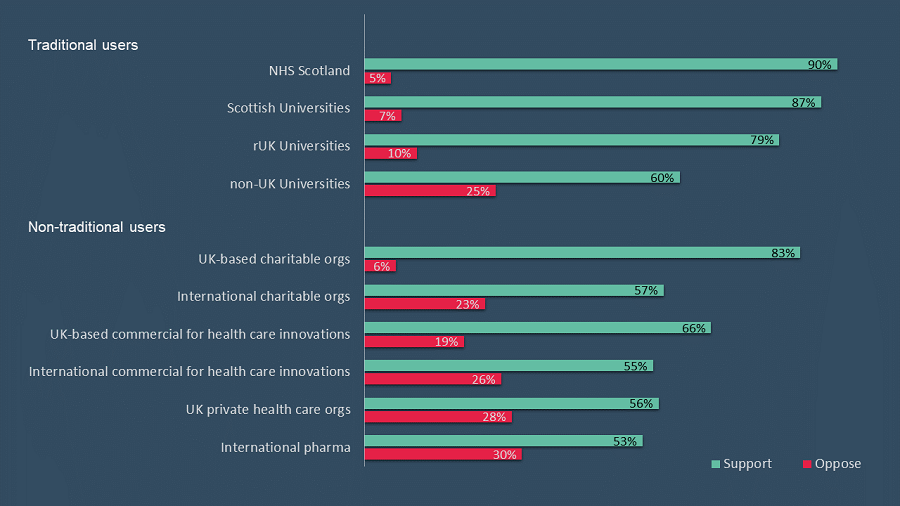A current priority of the DataLoch team is to explore the diverse views of South-East Scotland residents around access to health data. To meet this ambition, we have recently worked closely with Ipsos Scotland to develop a new survey and discussion-based workshops; the results of the survey element have now been published.
For this project, specific attention has centred on researchers defined as being either traditional (e.g. academic and health care professionals) or non-traditional (such as commercial organisations, charitable organisations, private health care companies, and pharmaceutical companies), to identify if and how access for each researcher category should be tailored.
Local residents mainly positive about health data access
Residents in South-East Scotland are broadly positive about the sharing of health data. A majority (72%) agreed more with the statement ‘We should share all the health data we can because it benefits health services and me’, than ‘We should not share health data as the risks to people’s privacy and security outweigh the benefits’. Only 14% held the opposing view.
More people are also supportive of access to health data for commercial organisations than are opposed to it. 60% of local residents agreed more with the statement ‘I would want the research to be conducted by commercial organisations if there is a possibility of new treatments for diseases, medical devices being developed, or health services being made more efficient’, than with the statement ‘I would not want commercial organisations to have access to this health data, even if this means the research does not take place’. 29% held the opposing view.
Looking at access to health data by type of research organisation, traditional researchers received higher support than non-traditional researchers. However, access to health data for all types of researchers, whether traditional or non-traditional, was supported by over half of the public.

Views on data sharing with AI developers were also broadly positive, with a majority (70%) in support of AI developers using health data about them for research and development purposes.
Conditions on access to health data
Respondents were also asked which conditions they would want to see in place before researchers were able to access health data about them for research purposes. For both traditional researchers and non-traditional researchers, the most popular conditions were:
· the removal of personally identifying information,
· strict rules that data could not be passed on to any other organisation,
· contracts put in place so data could only be used for agreed purposes, and
· data only being accessible in a secure IT environment.
Next steps
The survey results provide the context for the discussion workshops, the report for which is currently in development. Taken as a whole, the analysis from both research approaches will be used to identify areas where further engagement is required to provide additional clarity about the role of health data services. Recommendations from this project will also inform decision-making around DataLoch’s governance for providing access to health data for research and development, a key element of the DataLoch service’s full launch in July 2022.
Full report
Download the full report:
(PDF, 1.2MB)
Background note
This project is partly funded by UK Research and Innovation Grant Number MC_PC_21029 as part of Phase 1 of the DARE UK (Data and Analytics Research Environments UK) programme, delivered in partnership with Health Data Research UK (HDR UK) and ADR UK (Administrative Data Research UK).